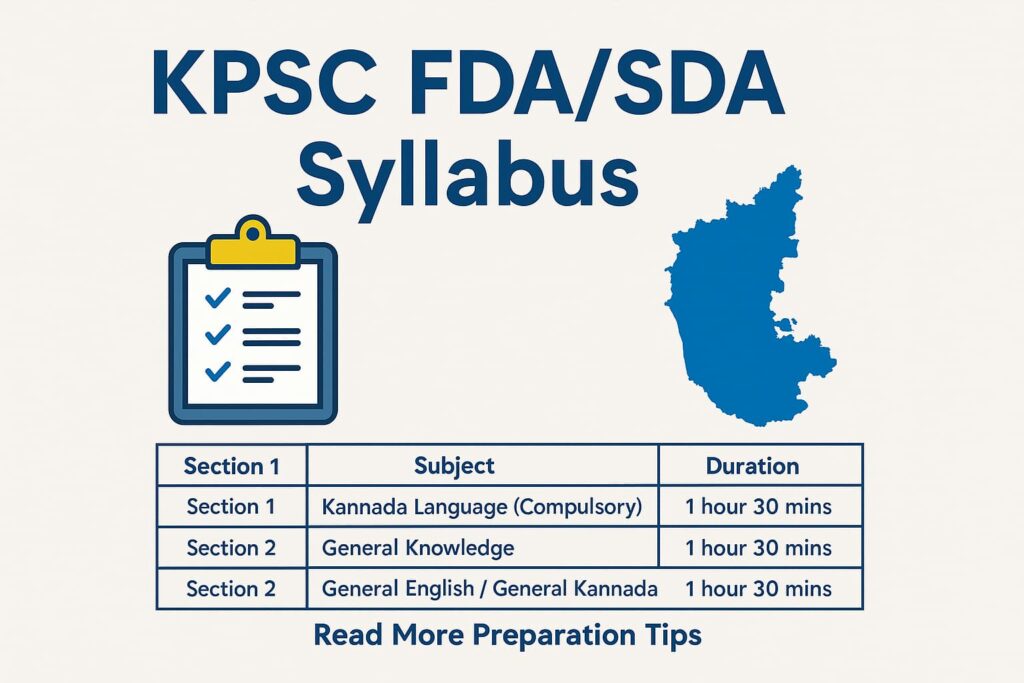The Karnataka State Police Department recruits eligible candidates for the post of constable through a competitive examination. To help you prepare effectively, we’ve provided the official syllabus released for this exam, along with a clear explanation and topic-wise breakdown.
In this article, you’ll not only find the detailed syllabus but also a practical study plan that suggests how to prepare systematically over a period of 30 days. This plan is flexible—you can adapt it into a 6-month or even 1-year schedule based on your comfort and available time. Our goal is to make your preparation focused, efficient, and achievable.
📘 I: Written Competitive Exam
| Paper | Subject | Type | Marks | Duration |
|---|---|---|---|---|
| Paper 1 | Competitive Exam | Multiple Choice | 100 | 1 Hour 30 Minutes |
Subjects Covered: General Knowledge, Science, Geography, History, Indian Constitution, Freedom Movement of India, Mental Ability, Ethics, and Civic Studies.
🛡️ II: Physical Standard & Endurance Test
| Category | Event | Minimum Requirement / Time |
|---|---|---|
| Men, Ex-Servicemen (Under 35 Yrs), Women (Except Tribal) | 1600 Meter Run | Within 6 minutes 30 seconds |
| Long Jump | Minimum 1.20 meters (3 attempts allowed) | |
| High Jump | Minimum 0.80 meters (3 attempts allowed) | |
| Shot Put (7.26 kg) | Minimum 5.60 meters (3 attempts allowed) | |
| Tribal Women and Men (Above 35 Yrs) | 400 Meter Run | Within 2 minutes |
| Long Jump | Minimum 0.90 meters (3 attempts allowed) | |
| High Jump | Minimum 0.60 meters (3 attempts allowed) | |
| Shot Put (4 kg) | Minimum 3.75 meters (3 attempts allowed) |
📝 Detailed Analysis of Competitive Exam Syllabus
| Paper | Subject | Type | Marks | Duration |
|---|---|---|---|---|
| Paper 1 | Competitive Exam Subjects Covered: General Knowledge, Science, Geography, History, Indian Constitution, Freedom Movement of India, Mental Ability, Ethics, and Civic Studies. | Multiple Choice | 100 | 1 Hour 30 Minutes |
General Knowledge: This section includes questions based on day-to-day observations, current affairs, state-related developments, and major national news. It is advisable to read newspapers daily and follow news media regularly. Special focus is given to economic updates, government schemes, and state events. Additionally, questions from static GK such as currencies, famous stadiums, and renowned personalities are also included.
Science: This section includes basic questions from everyday science, especially related to physics, chemistry, biology, and earth science. Most questions are based on concepts covered from class 5 to class 10 level. It also covers basic technology-related knowledge and real-life science applications observed in daily situations.
Geography: General Geography includes concepts from physical, human, and regional geography. Candidates can expect questions from school-level topics including continents, lakes, the solar system, climatic zones, Indian and world geography, and latitude-longitude related facts. It may also include questions on countries, capitals, and geographical phenomena.
History: The history section broadly covers Ancient, Medieval, and Modern Indian History. Questions are typically based on school and college textbooks. Special attention is given to major historical events, timelines, and notable movements. The Indian freedom struggle is also a significant focus, along with world history topics and important personalities involved.
Indian Constitution: This section is rich in questions about the structure and features of the Indian Constitution. Topics include the preamble, constitutional amendments, fundamental rights and duties, schedules, and key provisions. Questions may also include important events and people involved in the making of the Constitution, as well as recent constitutional changes.
Freedom Movement of India: Expect numerous questions from India’s freedom struggle, including events before 1947, timelines, revolutionary leaders, major protests, and declarations. This section may also include questions about the Prime Ministers and Presidents of India post-1947, and important political developments immediately after independence.
Ethics and Civic Studies: This section covers moral values, ethical principles, civic responsibilities, and duties of citizens. Topics include the role of ethics in society, political ethics, and moral education. Basic knowledge about the functioning of the police department and its responsibilities is also included in this section.
Mental Ability: This section includes reasoning-based and quantitative aptitude questions. Topics like number series, puzzles, logical thinking, basic math, and analytical ability are part of this segment, testing the candidate’s decision-making and problem-solving skills.
Below is a 30-day subject-wise preparation schedule designed to help candidates get ready for the Police Constable examination. Aspirants may adjust this plan and extend it over a longer period according to their convenience.
Taking regular breaks during preparation is equally important, and practices like meditation and yoga can help calm the mind and improve focus—making the study process more effective. So let’s explore the 30-day preparation schedule in detail.
📚 30-Day Study Plan for KSP Police Constable Exam
This plan is structured week by week to help you cover all major subjects with clarity, practice, and smart revision. You can adjust the timeline based on your availability.
📘 Week 1: Foundation Week
| Day | Subject | Topics |
|---|---|---|
| Day 1 | Syllabus + Motivation | Understand the exam pattern, list out subjects, and mentally prepare yourself with personal goals. |
| Day 2 | History | Study India’s and Karnataka’s Freedom Movement, including some basic world history events. |
| Day 3 | Constitution | Understand Fundamental Rights and Duties; focus on the formation of the Indian Constitution. |
| Day 4 | General Science | Cover Human Body, one-line science facts, and biology basics from school-level textbooks. |
| Day 5 | Geography | Learn about Karnataka rivers, forests, and regions; also practice through geography-based quizzes. |
| Day 6 | Mental Ability | Work on Number Series, Odd One Out, and practice solving them quickly with time limits. |
| Day 7 | Revision + Quiz | Quickly review everything covered in Week 1 and take a short self-test or online quiz. |
📗 Week 2: Concept Building
| Day | Subject | Topics |
|---|---|---|
| Day 8 | History | Post-Independence events; focus on remembering important dates and national milestones. |
| Day 9 | Current Affairs | Study top highlights from the last 3 months—focus on Karnataka and national updates. |
| Day 10 | Constitution | Learn about the Parliament, President’s role, elections, and revise via quizzes. |
| Day 11 | Science | Revise chemistry basics, common daily-use chemicals, and science formulas. |
| Day 12 | Reasoning | Focus on Blood Relations, Coding-Decoding, and improve logical thinking. |
| Day 13 | General Knowledge | Read about Karnataka’s festivals, folk culture, and use popular Kannada exam magazines. |
| Day 14 | Mini Test | Take a one-hour mock test with 100 questions to simulate real exam pressure. |
📙 Week 3: Strengthening Core
| Day | Subject | Topics |
|---|---|---|
| Day 15 | Previous Papers | Practice solving old question papers and get used to question pattern and timing. |
| Day 16 | Indian Constitution | Revise core constitutional concepts, such as the Preamble and important articles. |
| Day 17 | Reasoning | Practice Calendar, Clock-based questions, and time-based logical problems. |
| Day 18 | Economy | Study Karnataka’s economy, latest budget info, and central government schemes. |
| Day 19 | General Knowledge | Revise Freedom Fighters, historical sites, and use GK books for fact-checking. |
| Day 20 | Science | Learn about common human diseases, vaccinations, and basics of environmental science. |
| Day 21 | Mock Test + Analysis | Attempt a full mock test, and review all your mistakes to understand weak areas. |
📕 Week 4: Final Push
| Day | Subject | Focus |
|---|---|---|
| Day 22 | Revision | Revise Constitution & History with quick notes and practice questions. |
| Day 23 | Practice | Focus on time management: practice solving 100 questions within 90 minutes. |
| Day 24 | Current Affairs | Revise current events from the past 30 days using newspapers and apps. |
| Day 25 | Full Syllabus Quiz | Take a full-length test covering all subjects you studied so far. |
| Day 26 | Weak Areas | Target your low-scoring subjects or mistakes from mock tests. |
| Day 27 | Reasoning + Science | Mix of problem-solving, formulas, and reasoning puzzles. |
| Day 28 | Mental Ability Practice | Practice reasoning and aptitude problems like puzzles, number series, and logical questions. Revisit questions you previously found difficult and improve your accuracy. |
| Day 29 | Quantitative Aptitude | Practice math-based problems including averages, ratios, percentages, and speed-distance. |
| Day 30 | Final Mock + Rest | Take your last full test and spend the rest of the day calmly reviewing key notes. |
🎯 Final Words
Cracking the Karnataka Police Constable Exam is absolutely achievable—if you approach it with the right strategy. This 30-day study plan is designed for serious aspirants who value clarity, discipline, and structured preparation.
By staying committed to the syllabus and being aware of the current level of competition, you give yourself a better chance at success. Remember, the competition today is intense—so it’s not just about studying hard, but also studying smart. Consistency, focus, and smart time management are your real weapons.
Make sure you stick to the official KPSC syllabus guidelines and understand the subject areas in depth. Knowing what to study is half the battle won.
Also, stay updated with the latest government job notifications and related opportunities in Karnataka. Being aware of what’s happening in the job sector helps you prepare better and smarter.
Remember, the competition today is tougher than ever—so focus on both hard work and smart work. Stay committed, stay consistent, and success will follow.


